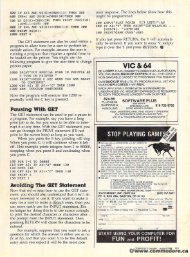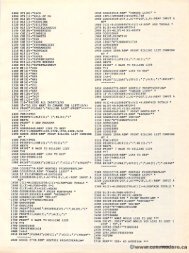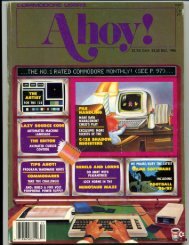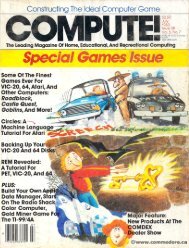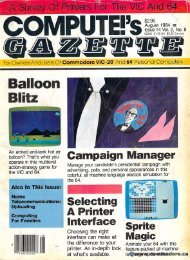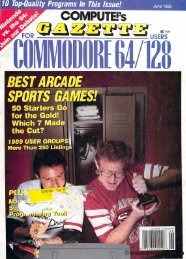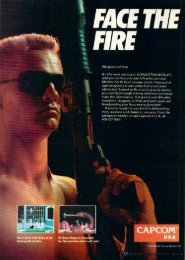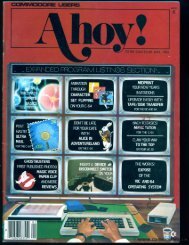May June 1980 - Commodore Computers
May June 1980 - Commodore Computers
May June 1980 - Commodore Computers
You also want an ePaper? Increase the reach of your titles
YUMPU automatically turns print PDFs into web optimized ePapers that Google loves.
MAY/JUNE. <strong>1980</strong>. 198O. ISSUE 4. COMPUTE. 95 ■5<br />
Edilor Editor's 'j Nole: Note: / In 11 flllllre future ismts, issues, llle'II/Jrtsrnl we'll present inlerviews interviews wilh with<br />
J\ Marketing ' arJ.:t:li".t: /Jrrsmlnel personnelfrom Alari Atari (Iud and <strong>Commodore</strong>.<br />
An Interview<br />
With<br />
Taylor Pohlman<br />
Taylor Pohlman<br />
Apple's Ap~le's Product<br />
Marketing<br />
Michael<br />
Manager g S Tomczyk<br />
Manager<br />
Recently, I had an opportunity to talk with Taylor<br />
Pohlman, Apple Computer's Product Marketing<br />
Manager. Taylor is 33 years old aand came to Apple<br />
less than a year ago from Hewlett Packard, where he<br />
was educational marketing manager. During our interview,<br />
he discussed two important areas -- computer<br />
dealers and consumers.<br />
HeH e described two basic types of dealers, noting<br />
that dealers are first of all businessmen and secondly,<br />
tend lend to operate in those markets they are most<br />
comfortable or experienced in.<br />
The first type of dealer is the hobbyist who becomes<br />
a businessman. For these dealers, technology is<br />
the e key. Since the first-round hobbyist market is<br />
pretty y much saturated, Pohlman n feels these dealers<br />
have to start moving g from hardware re —-- their original<br />
orientation -- to software, and the application io n problems<br />
ol of non-hobbyist users.<br />
The second type of dealer is the retail businessman.<br />
ToT o them, , selling computers is much like selling hi-fi<br />
stereo systems. A fair amount of retail audio-visual<br />
anda electronics outlets are personal computer dealers,<br />
he said, anda many have already y developed the exper<br />
tise needed to reach the computer market. A-V<br />
stores Stores may already be dealing with schools, for<br />
r<br />
example, and the educational market is a natural<br />
for them. . Small stores also relate well to small businessmcn<br />
because the dealers, as businessmen, , have them<br />
emselves<br />
encountered problems in general ledger keeping,<br />
manufacturing, accounting, etc.<br />
men<br />
"The " personal computer market is emphasiz<br />
ing g solution-oriented merchandizing as opposed to<br />
hardware-oriented merchandizing," Pohlman n said,<br />
and this poses important t challenges for r all types of<br />
computer dealers. He said Apple has 600 to 700<br />
computer dealers, all with different interests, sales<br />
and facilities. Some sell a single line and others a<br />
complete line, from m small games to LO minicomputers.<br />
m "The " question n they all have to ask is, who are an:<br />
those hungry people outside outsidc the store sLOre who have<br />
problems to be solved by a personal computer? m pUler? At<br />
Apple, we try to 10 turn the dealers on to those markets --<br />
and solutions -- whatever the dealer's ''focus'. By<br />
''focus' I mcan mean hobbyist, businessman, educator, , home<br />
entertainment user. .... . .but whatever it its s focus, a<br />
good Apple store doesn't n )t confuse the e custOmer.<br />
customer.<br />
""For example, the businessman doesn't ' t want to<br />
know this microprocessor runs 20 percent faster than<br />
that one. He wants to know will it solve hiss<br />
problem? On the other hand, the store that just has<br />
a bunch of hardware silting sitting aaround may respond well<br />
to the hobbyist by making the hardware available on<br />
the floor aand letting himm look inside." " (Incidentally,<br />
Taylor Pohlman's n definition of a computer hobbyist is,<br />
""the e individual who's interested ted in thee manmachine<br />
interface.")<br />
Hee kept emphasizing that the key to the overall<br />
personal computer market is problem-solving. In this<br />
regard, rd , Apple's magazines aand other literature ture are<br />
rc<br />
designed to trigger people's problem-solving<br />
approaches and stimulate their imagination. ation . He also<br />
called attention to the company's seminarr program,<br />
which encourages dealers to get out and give seminars<br />
where thee people are arc -- at Rotary Clubs orr real<br />
estate groups, forr example. Apple provides instruc<br />
tional and advertising materials to dealers for this<br />
purpose.<br />
""For the dealer to survive in the new marketplace,<br />
he's also goingg to havc have to provide service aand<br />
suppOrt support -- not just j sales," he said. Consequently,<br />
Apple has a modular design and can be field-repaired<br />
at over 500 dealer-based repair centers, in 24 hours.<br />
If the e dealer can't ' t repair it, , he can simply replace the<br />
failed part aand send it to Apple for repair. This is<br />
especially {"spcciall y important to the businessman, who can't<br />
allord afford to have his general ledger or other system<br />
go down for a week.<br />
Turning his s attention attcn tion to consumers, he guessed<br />
that there therc are "tens " of 0(" thousands" of Apples in<br />
homes, mcs, schools, and companies. "We're " the oneo personal l computer vendor that has achieved a truly<br />
disk-basedd population n -- as opposedo to those who are<br />
still outo there hyping g cassettes. es. Disk-based software<br />
is more ma rc sophisticated and makes the e Apple more useful<br />
and powerful as a problem-solving tool. LOol.<br />
"What " I, as a consumer, , want t is a computer<br />
that allows me to define e a problem and allows the<br />
machine to solve it in language and terms that t I<br />
can n understand. nd. If the problem is solved I could care<br />
less what the e machine is doing." He added that lhal the<br />
e<br />
level of computer pUler awareness is very high but the<br />
level of computer literacy is not nearly high enough to<br />
create the e "home " computer revolution," mostly y because<br />
right now using g a computer means you u have to:<br />
- define a problem<br />
- create an algorhylhm ythm lo to solve the problem<br />
- write e programs to express the algorhythm<br />
hm<br />
- put the e program in the e computer<br />
- run n and debug (he th e program<br />
"A lot of time lime is wasted trying tryill g to translate LranslaLe information,<br />
,<br />
and a this is wasted time is directly y related to the reluclance<br />
—-- or lack of reluctance -- of customers lo to tance get




